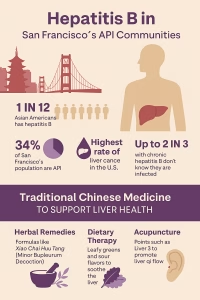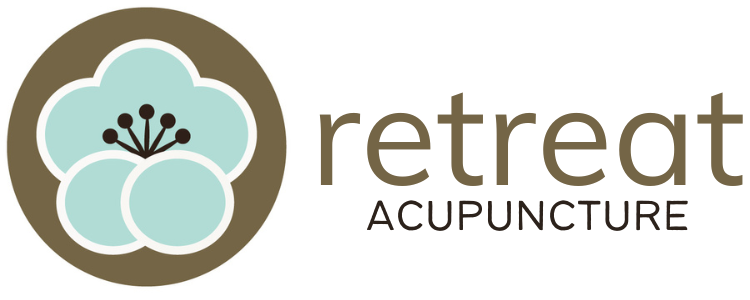By Greg Zimmerman, L.Ac., PhD(c)
Traditional Chinese Medicine Practitioner – Integrative Medicine and Acupuncture Science Specialist
📍 Why This Matters in Lower Pacific Heights & Japantown
Lower Pacific Heights and Japantown are vibrant, culturally rich communities with deep ties to East Asian heritage. But with this heritage comes a hidden health risk: hepatitis B.
San Francisco has the highest rate of liver cancer in the U.S., and Asian Americans account for more than half of all hepatitis B cases, despite being only 6% of the U.S. population. In the Bay Area, over 80,000 residents—mostly from the API community—are estimated to be living with chronic hepatitis B, many unknowingly.
(Source: UCSF Asian Liver Center, SF HIP, CDC)
🧪 What Is Hepatitis B?
Hepatitis B is a viral infection that affects the liver. It’s often called a silent disease because people may live with it for years without symptoms. Left untreated, it can lead to cirrhosis, liver failure, or liver cancer.
Risk Factors Include:
- Being born in an Asian country or to Asian parents (especially before 1992)
- Family history of hepatitis B
- Lack of infant immunization
- Unsafe sex or sharing needles
🧧 A Traditional Chinese Medicine Perspective
In TCM, the Liver (肝) is not only a detoxifying organ—it’s the emotional and energetic pivot of the body. It governs the smooth flow of qi (energy) and blood, regulates emotions (especially anger and frustration), and influences digestion and menstruation.
Hepatitis B may not have a direct corollary in classical Chinese medicine texts, but modern practitioners approach it through the lens of “Liver Qi Stagnation,” “Damp-Heat in the Liver-Gallbladder,” and “Liver Blood Deficiency.”
🌿 TCM Treatment Options for Liver Support and Immune Balance
🔸 Herbal Medicine
Formulas are tailored based on pattern differentiation. Commonly used herbal approaches include:
- Xiao Chai Hu Tang (Minor Bupleurum Decoction)
For alternating fever and chills, chest discomfort, bitter taste—indicating Shaoyang disorder, often seen in liver inflammation. - Long Dan Xie Gan Tang
Clears Damp-Heat from the Liver and Gallbladder—applicable in cases with jaundice, irritability, or skin itching. - Yi Guan Jian
Nourishes Liver Yin in patients with chronic fatigue, dry eyes, and irritability, supporting long-term liver regeneration.
🧠 Note: TCM herbs should always be prescribed by a licensed practitioner after a full diagnosis. Many formulas also have hepatoprotective and immune-modulating properties supported by modern research.
(Wang et al., Frontiers in Pharmacology, 2021)
🔸 Acupuncture
Acupuncture can regulate liver function, reduce systemic inflammation, and support immunity. Commonly used points include:
- Liver 3 (Taichong): Moves Liver qi, relieves stress
- Gallbladder 34 (Yanglingquan): Clears Damp-Heat
- Spleen 6 (Sanyinjiao): Strengthens digestion and Yin
- Large Intestine 11 (Quchi): Clears Heat and inflammation
📚 Recent meta-analyses have shown acupuncture’s potential in improving liver enzyme levels, fatigue, and digestive symptoms in patients with chronic hepatitis.
(Zhou et al., Medicine (Baltimore), 2020)
🌱 Integrative Wellness & Functional Medicine Principles
A holistic care plan for patients with hepatitis B or those at risk includes:
🥗 Nutrition Therapy
- Anti-inflammatory, Mediterranean-style diets with bitter greens, cruciferous vegetables, and herbs like turmeric, garlic, and ginger
- Avoiding alcohol, processed fats, and high-sugar diets
- Supportive foods in TCM: mung beans, chrysanthemum tea, daikon radish, and dandelion root
🛌 Lifestyle & Emotional Health
- Stress management: Liver is the “general” in TCM—when under stress, it over-controls the body.
- Movement: Gentle exercise like tai chi, qigong, and walking promotes Liver qi flow
- Sleep hygiene: Liver detoxifies most actively from 1–3 a.m. in the TCM body clock
🧬 Functional Testing
- Functional medicine labs can support TCM diagnostics with liver enzyme panels, gut microbiome testing, and inflammatory markers to monitor chronic inflammation and immune status.
📊 Infographic: Hepatitis B in the Bay Area

✅ Action Steps for Our Community
-
Get Screened: Especially if you’re of Asian descent and haven’t been tested before.
-
Get Vaccinated: The hepatitis B vaccine is safe and effective—and usually free at local clinics.
-
Know Your Status: If you’re positive, regular monitoring can prevent liver damage.
-
Seek Integrative Care: Work with a licensed acupuncturist or TCM doctor alongside your primary care provider.
-
Share This Post: Help raise awareness in our community.
📍 Where to Get Help
- San Francisco Hep B Free Campaign
sfhepbfree.org - Asian Liver Center at Stanford
liver.stanford.edu - Your Local TCM Clinic – Retreat Acupuncture
Visit: www.retreatacupuncture.com
Book a consultation to explore liver-supporting acupuncture and herbal care.

